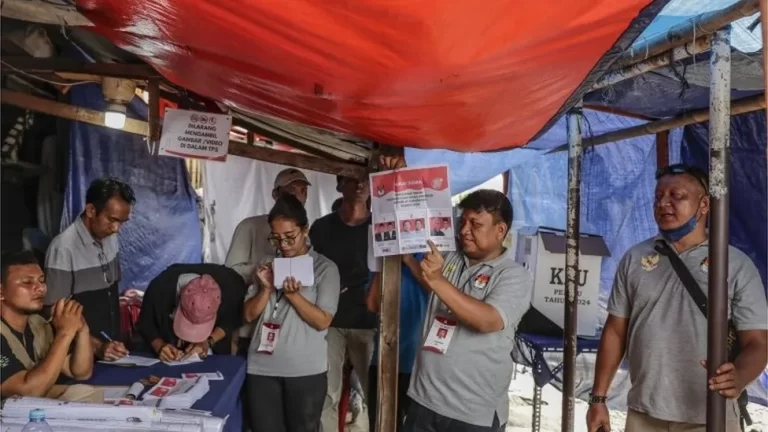Indonesia's defence minister Prabowo Subianto is on course to become the country's next president after early results showed him winning more than half of votes cast in the first round.
“This victory is victory for all Indonesians,” he told cheering supporters, hours after polls closed. Early polling samples showed the feared former general winning more than 57% of votes, avoiding a second round run-off.
Full results in the world's largest single-day vote are not due for weeks. But Indonesia's state-approved polling samples – so-called “quick counts” performed within hours of voting – have been relatively accurate in previous years.
Mr Prabowo, 72, is a polarising figure whose popularity has prompted fears that Indonesia is in danger of sliding back towards its authoritarian past. A former special forces commander under the dictator General Suharto, and his son-in-law, he has been dogged by allegations of human rights abuses.
He was greeted by crowds of cheering supporters at an indoor arena in Jakarta shortly after polls closed – and cautioned jubilant supporters not to be arrogant.
“Even though we should be grateful, we must not be arrogant, not euphoric, remain humble; this victory must be a victory for all the people of Indonesia,” said Mr Prabowo, who heads the Advanced Indonesia Coalition.
He also mentioned the names of former presidents, including a note of gratitude to outgoing President Joko Widodo whose policies he has promised to continue. He ran unsuccessfully against Mr Widodo, who remains hugely popular, in the last two elections. However, the man known as “Jokowi” must now stand down after two five-year terms.
Many voters said they were disillusioned with their voting options. “The difficulty of this election is that none of the choices is clear-cut on the issues, so the challenge for us voters is to choose the least-worst option,” a businessman in central Jakarta told the BBC.
But another voter, currently living in Germany, said “Indonesia really needs a strong figure”, supporting the idea of the former general gaining office.
“Prabowo could be a good president,” she said.
More than 205 million voters across Indonesia's 17,000 islands and three time zones were eligible to vote in the world's biggest and most complex one-day election. Mr Prabowo faced two former provincial governors, Ganjar Pranowo and Anies Baswedan. By late evening local time, quick counts showed them trailing far behind him, on 17% and 25% respectively.
Prabowo Subianto ran a clever, upbeat social media campaign which completely refashioned his image, from tough-talking soldier, to that of an avuncular, slightly comical, elder statesman. It proved very effective, in particular with younger Indonesians who have little knowledge of Mr Prabowo's controversial past.
As a member and later commander of Indonesia's elite special forces he was accused of serious human rights abuses during the occupation of East Timor, and of ordering the abduction and torture of student activists in the last days of the Suharto regime in the 1990s.
He denies the allegations and has not been convicted of anything. He was helped in the election by the support of Mr Widodo, who came in for criticism when his eldest son, Gibran Rakabuming Raka, joined Mr Prabowo as running mate.
There were cheers from supporters when the pair entered the arena on Wednesday night. Mr Prabowo reminded them they must still wait for official results from the election commission. But he told the cheering crowd: “We are grateful for the quick count results. All the calculation, all pollsters including those on our rivals' side – the figures showed a Prabowo-Gibran win in one round.”
Given the size of Mr Prabowo's early lead, there were few signs of optimism from his opponents. Anies Baswedan, his nearest challenger going by the quick counts, said he planned to continue his movement for change and pointed out that vote tallying was not over.
“We will wait until the official result and we will respect it,” the Coalition of Change for Unity (KPP) leader and former governor of Jakarta told reporters at his campaign headquarters.
Ganjar Pranowo, whose Indonesian Democratic Party of Struggle (PDI-P) supported Mr Widodo's election runs, had been tipped to succeed him early on before the latter distanced himself from his party's campaign.
Mr Ganjar was nowhere to be seen when BBC Indonesian visited his headquarters in central Jakarta. “Ganjar left, just saying he wanted to go home. I don't know where he is,” one journalist said. Even after 10 years in power, outgoing President Widodo has high approval ratings in Southeast Asia's largest economy, thanks to his informal leadership style and signature infrastructure projects.
But he has been accused of weakening Indonesia's democratic institutions, and abusing his power in his alliance with Mr Prabowo. For many Indonesians Mr Prabowo's all-but-certain victory sets a new and troubling direction for their young democracy.
— CutC by bbc.com


